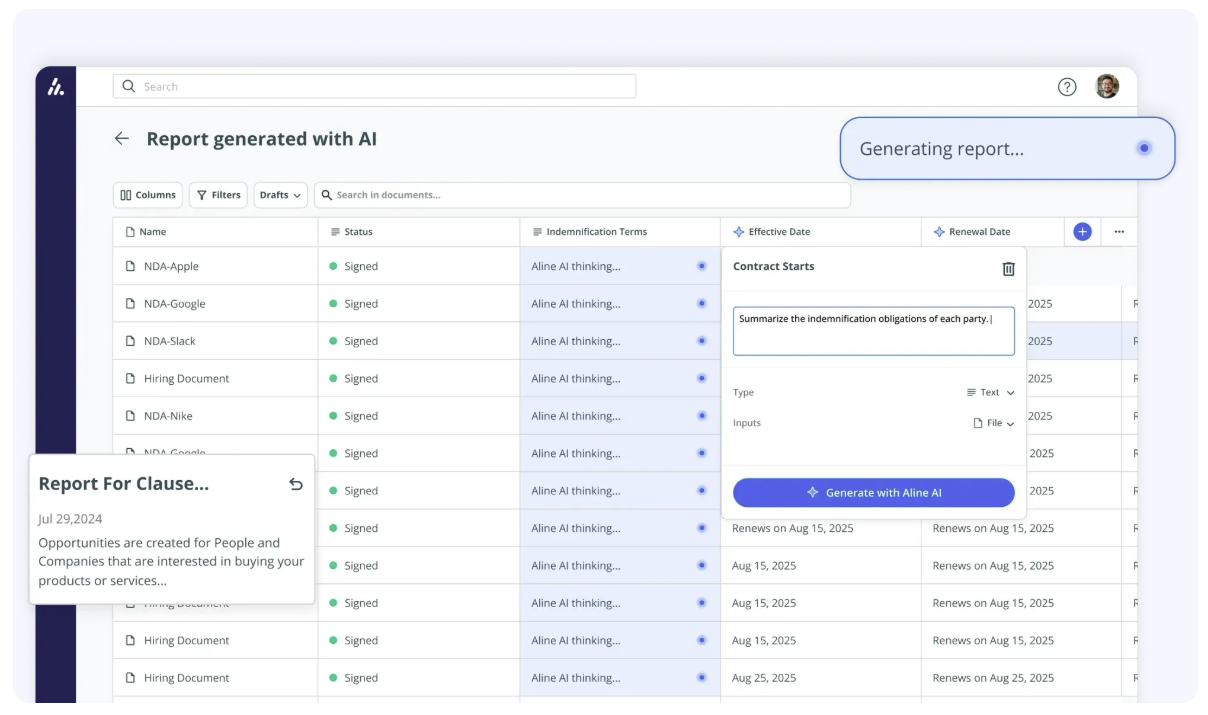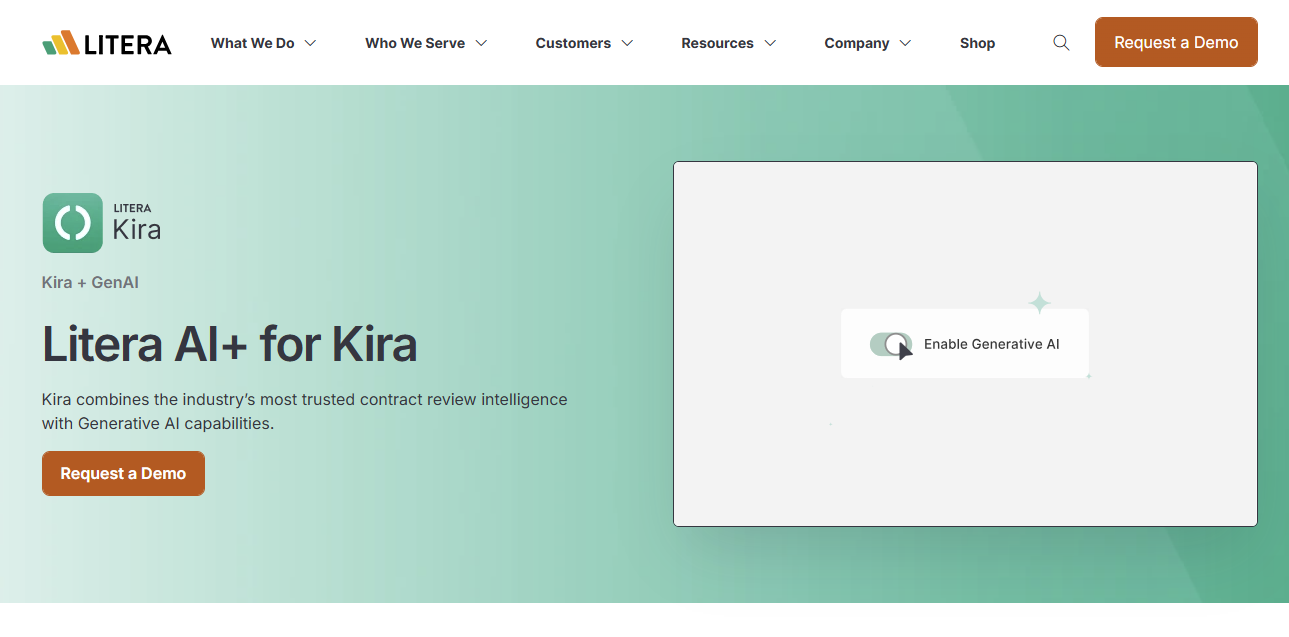If you’re already using contract analysis software, you know it can save time, but not every tool delivers the same results.
Some platforms still rely on clunky search functions and basic tagging, while newer options use AI to flag risky clauses, break down disclosure schedules, and highlight payment terms automatically. That difference matters.
Plus, AI-driven tools don’t just scan text. They speed up the review process, fit into daily workflows, and help teams keep contracts aligned with company standards.
In other words, the gap between older systems and modern platforms can mean hours saved per contract and fewer mistakes slipping through.
In this guide, we’ll look at what separates the best AI-powered options from the rest, the features worth paying attention to, and which tools are leading the way right now.
Most contracts aren’t short, and going through them word for word can drain both time and energy.
According to Procurement Tactics, a single human contract review takes about 92 minutes, and that’s only for one document. Multiply that by dozens or hundreds, and you can see why manual review is a major time loss.
Contract analysis software (or contract review software) tackles this problem by scanning legal documents and pulling out the contract data that matters most.
For example, dates, obligations, renewal terms, and compliance details are highlighted in minutes. All that data then becomes readily available for further inspection. While it doesn’t replace legal expertise, it gives professionals faster access to the insights they need.
The importance is clear: quicker contract reviews mean fewer delays, fewer missed details, and more time for actual decision-making. We'll talk about more benefits later.
Picking the right AI contract review software comes down to the features that actually help your team. The goal is to make it easier for legal teams to review contracts, manage risks, and stay organized through the entire contract process.
With all that in mind, here’s what to look for:
With these features in place, contract analysis software makes reviewing contracts a lot less stressful and a whole lot quicker. If you’re ready to see that difference in practice, Aline AI lets you draft, negotiate, and sign contracts 5–10x faster.
You can try it yourself by starting a free trial today.
Now that you know what features matter most, it’s time to look at the tools that bring them to life. Here are some of the top contract analysis software options you can try:
Aline is a contract lifecycle management (CLM) platform built to take the pressure off teams facing tight deadlines and complex negotiations.
Essentially, Aline brings the entire contract management process into one AI-powered system. From contract creation to final signatures, it helps teams save time, reduce risk, and make smarter decisions.

Because it’s designed with both lawyers and business users in mind, Aline makes legal contract review faster while keeping company policies consistent across every deal.
That means sales can move contracts forward without waiting on long legal back-and-forths, procurement can stay confident in compliance, and leadership gains better visibility into data for strategic decision-making.
See how much faster contracts can move when everything’s in one place. With Aline AI, you can draft, negotiate, and sign agreements up to 10X faster while staying compliant and in control. Start your free trial today.
HyperStart CLM is a contract management tool built for small to mid-sized companies that want a straightforward way to manage their actual contracts without getting lost in administrative tasks.

While it covers the full lifecycle, its strength in AI contract analysis software makes it useful for teams that need quicker insights into terms and conditions. The platform highlights key details so users can focus on decisions rather than manual reviews.
Conga CLM is a go-to platform for many large companies that need to manage contracts across different departments. It’s especially popular with sales teams that rely on Salesforce, but its value goes beyond just workflows and automation.

One of its strengths is helping users cut through the noise in lengthy agreements. Rather than reading every page, teams can lean on its AI contract analysis software to spot critical clauses and highlight the information that matters most.
This makes it easier to control contract terms, reduce review time, and even find opportunities for cost savings along the way.
Summize is suitable for teams and law firms that want contract reviews to feel less like a slog. To do that, the AI assistant pulls out the key points so you can focus on what really matters.

For legal professionals, it means the contract review process is quicker without sacrificing accuracy. For business users, it’s a way to get clear answers without needing deep legal knowledge.
By keeping agreements aligned with legal standards and boosting operational efficiency, Summize gives teams a practical way to handle contracts day to day.
Ironclad has built a reputation as one of the more modern platforms in the contract space, with a focus on usability and scalability.
What makes it stand out for analysis is how it blends an AI-powered contract system with human oversight. The AI helps surface key terms and clauses quickly, while the platform still gives legal teams the final say.

That balance makes it easier to stay confident that contracts not only move faster but also meet company standards.
Another point in Ironclad’s favor is compliance. The platform supports compliance certifications and provides built-in checks, which are especially helpful for organizations working under strict regulations.
Kira Systems is well-known for its strength in contract analysis, especially in large-scale reviews where accuracy is non-negotiable.

It’s designed to help teams cut down on manual reading by using AI to handle critical tasks like clause identification and risk assessment. That frees legal staff to focus on high-value tasks such as contract negotiations and strategy, rather than spending hours on routine checks.
For organizations with strict compliance needs, Kira brings enterprise-grade security and fits neatly into existing workflows, which is why it’s often adopted by bigger law firms and corporate legal departments.
On top of that, it produces detailed reports that break down findings in a way both lawyers and business stakeholders can act on.
Luminance Diligence focuses on speeding up contract reviews while reducing the risk of human error.
Its AI is designed to handle repetitive tasks like scanning lengthy agreements and flagging issues, so in-house legal teams can spend more time on complex work.

The platform also gives organizations tighter control through role-based access, which can make it easier to decide who can view, edit, or approve certain contracts. This is particularly helpful for in-house legal teams that need a balance between collaboration and security.
With its focus on efficiency and oversight, Luminance Diligence is a good option for companies that want reliable analysis without piling more work on their legal staff.
You’ve seen how contract analysis tools turn stacks of legal documents into clear, searchable, and actionable insights.
But let’s pause and ask: what would it really mean for your team if contract reviews didn’t feel like a chore? What if your legal, sales, and operations folks could shift their focus from paperwork to planning?
That’s exactly where Aline steps in; not just as another CLM, but as a next-level approach for how you handle contracts.

It blends AI-powered analysis across the entire contract lifecycle to make sure your documents don’t just get reviewed: they get done faster, smarter, and more in line with your company standards.
Here’s what you could be doing instead:
Curious how much smoother your workflow could be? See Aline in action and feel the difference. Start your free trial now.
Several platforms use artificial intelligence to analyze contracts, but the right choice depends on your needs. Tools like Aline, Kira Systems, and Luminance Diligence are popular because they identify clauses, highlight risks, and generate reports that save time for legal and business users.
The best option varies by company size and workflow. Some businesses prefer all-in-one AI contract management software like Aline, while others choose tools that focus on specific areas such as reporting or compliance.
Look for features that help you track progress across the contract lifecycle and keep your team aligned.
ChatGPT can read text and point out certain details, but it isn’t a replacement for dedicated contract review software. Specialized platforms are built with features like clause extraction, risk alerts, and compliance checks that ChatGPT doesn’t provide.
Human legal expertise is still needed for final review.
The best AI for contracting should support legal teams, sales, and procurement teams by reviewing payment terms, checking disclosure schedules, and keeping contracts consistent.
Leading platforms also help track progress and reduce manual work, making them reliable for both large enterprises and smaller businesses.

